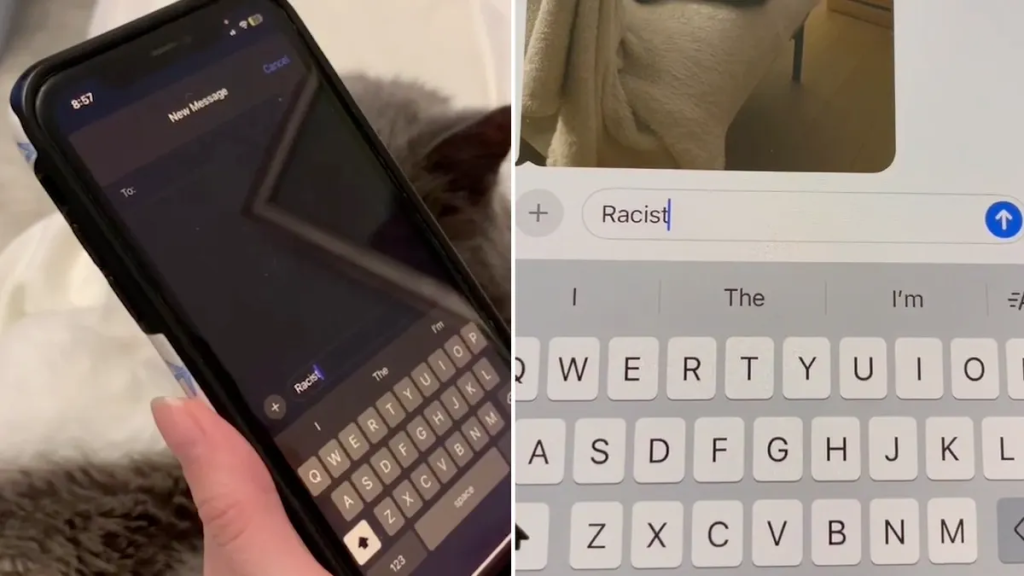A recent glitch in Apple’s iPhone voice-to-text feature has ignited a heated debate on social media and beyond. Users discovered that when speaking the word “racist,” the dictation tool would briefly transcribe it as “Trump” before quickly correcting itself. This unexpected error has sparked controversy, with critics questioning the technology behind what some are calling a “racist iPhone” moment, while others are left asking, what is racist in the context of automated speech recognition?
A Case of Phonetic Overlap
The issue came to light after a viral TikTok video showed an iPhone user dictating the word “racist,” only to have it momentarily appear as “Trump.” Fox News Digital and The Financial Times later confirmed that they could replicate the glitch several times during tests. According to Apple, the bug stems from its speech recognition model, which sometimes displays words with similar phonetic components. In this instance, the model temporarily mistook the “r” sound in “racist” for a phonetic match with “Trump” before correctly transcribing the word.
Apple spokespersons have acknowledged the problem, with one stating, “We are aware of an issue with the speech recognition model that powers Dictation, and we are rolling out a fix as soon as possible.” The company clarified that this issue isn’t exclusive to the word “racist”—other words with an “r” consonant have also shown similar behavior during dictation.
Accusations and Allegations
The mishap quickly became a lightning rod for controversy, particularly among conservative circles. Political commentator Alex Jones, among others, accused Apple of “subliminal programming” and suggested that the glitch was more than just a technical error. Critics have been quick to use the incident to fuel broader debates over tech bias and the influence of political figures in digital media. Some have even labeled the episode as evidence of an “apple racist” phenomenon—a claim that has added fuel to an already contentious discourse.
At the center of this storm is U.S. President Donald Trump, whose name inadvertently appears during the glitch. While the substitution was brief and unintended, the occurrence has reignited discussions about the intersection of technology, political messaging, and user experience on platforms powered by iOS.
iOS and the Ongoing AI Evolution
This isn’t the first time Apple has faced scrutiny over its artificial intelligence features. The company recently introduced a new AI system known as Apple Intelligence, aimed at enhancing the functionality of its iOS devices. However, this rollout has been marred by a few missteps, including a recent incident where an automated news summary feature provided inaccurate information, forcing Apple to disable the service temporarily.
The current dictation bug is yet another reminder that even tech giants are not immune to the challenges of perfecting AI-driven services. As Apple continues to refine its models, it remains under the microscope—not only for its technological prowess but also for how its products engage with politically charged content.
Apple’s Relationship with Political Figures
The timing of this glitch is particularly notable. The issue surfaced just a day after Apple announced plans to invest $500 billion in the United States over the next four years—a move seen by many as a bid to strengthen ties with the Trump administration. In recent months, Apple CEO Tim Cook has made headlines for his meetings with President Donald Trump, highlighting a complex relationship between the tech giant and U.S. political leadership.
This investment, alongside Cook’s past support of Trump (including a $1 million donation to his inauguration), has only deepened the intrigue around Apple’s latest dictation mishap. For many, the accidental appearance of “Trump” in place of “racist” seems to intersect uncomfortably with ongoing debates about political influence and bias in technology.
A Hot Fix Is Underway
Apple has assured its users that a fix is imminent. The company’s quick response suggests that the incident is being treated as a high priority—an effort to restore confidence in its AI and dictation capabilities. Users of iOS devices are encouraged to update their software as soon as new patches become available, ensuring that the glitch no longer disrupts their experience.
As Apple works to correct this error, the broader conversation about technology, political influence, and bias continues to evolve—prompting us all to ask, what is racist in our increasingly digitally-dependent world?


